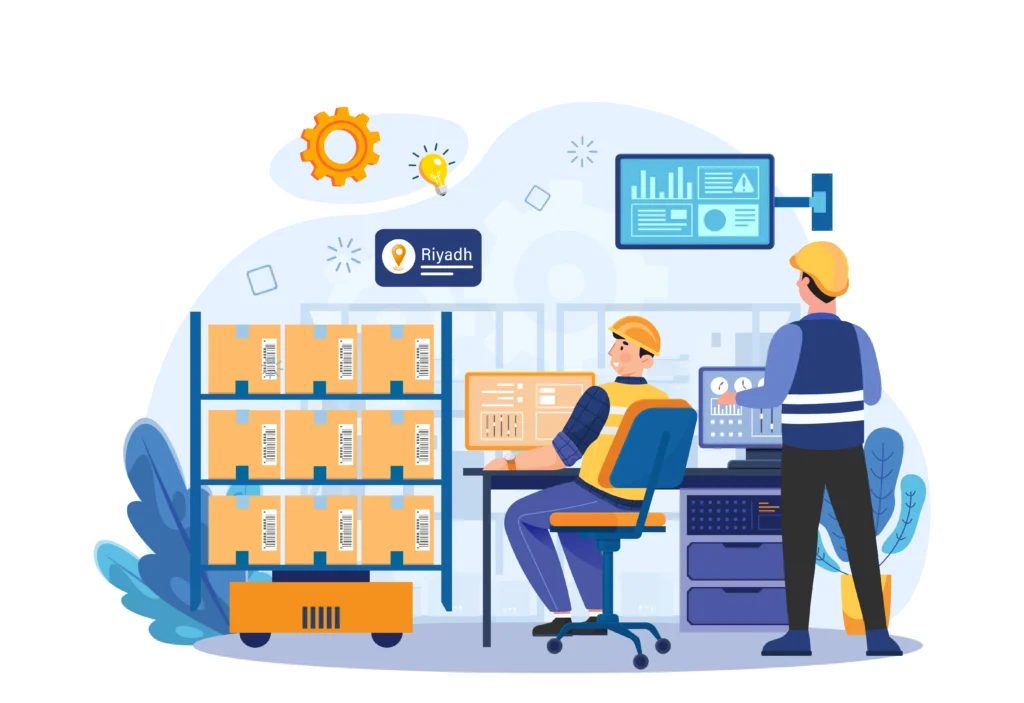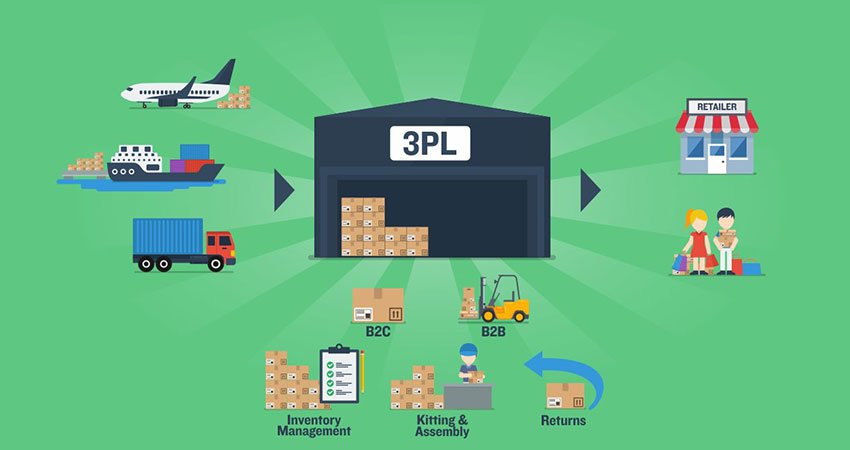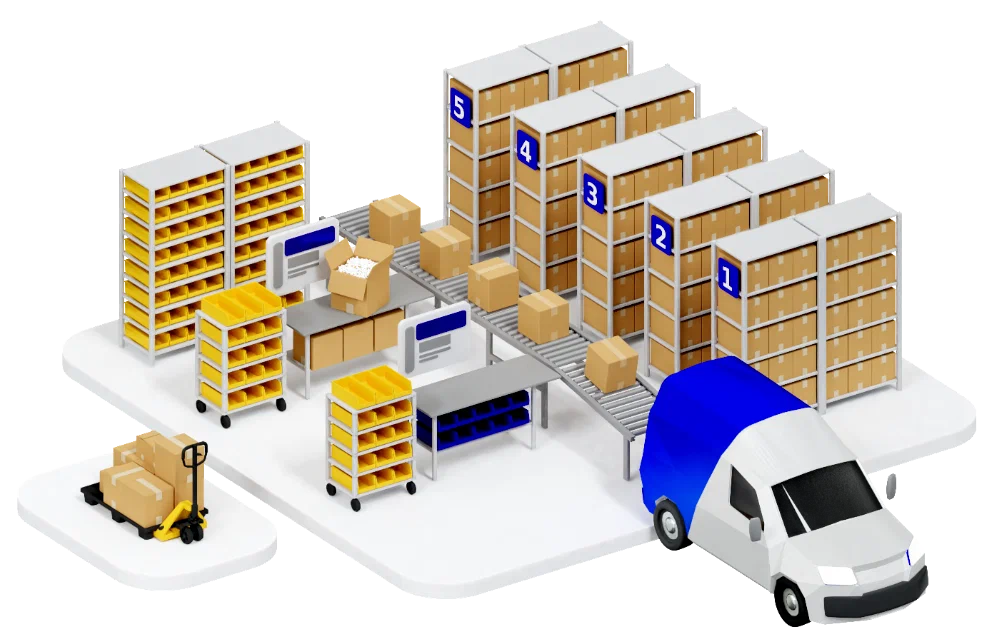Opening a food storage warehouse involves more than just providing space for products, it requires meticulous adherence to safety and quality standards to ensure the well-being of consumers. Whether you’re starting from scratch or refining your current operations, understanding the specific requirements for dry, chilled, and frozen food storage is essential.
In this article, we’ll talk about the critical regulations and best practices for maintaining the facility for food warehouse services in Riyadh. Ensuring that your warehouse meets these standards protects your business and guarantees your customers’ safety and satisfaction.
Defining Food Warehouse Services in Riyadh
Food warehousing is essential for the storage and distribution of both perishable and non-perishable food items.

These facilities ensure optimal conditions for various food products, from fresh produce to canned goods, by maintaining strict hygiene standards and using advanced technology for inventory management.
The Functions of Food Warehousing
- Receiving Shipments: Inspections and quality control checks are vital when unloading and documenting shipments.
- Storage: Proper placement in dry, refrigerated, or frozen areas follows the first-in-first-out (FIFO) principle.
- Inventory Management: Utilizing software tracking stock inflows and outflows ensures a steady supply chain.
- Order Fulfillment: Accurate packing and additional quality checks guarantee a positive consumer experience.
- Ensuring Food Quality and Safety: Maintaining food quality involves strict temperature control to prevent contamination, with specific temperature guidelines for different types of food. Compliance with regulations set by authorities like the FDA is crucial, involving regular inspections, sanitation, pest control, and proper packaging with traceability.
Understanding Food Warehousing: Long-Term and Short-Term Solutions
Handling consumables requires strict compliance with regulatory standards, making warehousing a critical component of the food and beverage industry. Food warehouses must follow accurate strict cleanliness, recordkeeping, and safety procedures to maintain their licenses, especially during supply-chain crises.
-
Long-Term Food Storage
Long-term storage is essential for items with extended shelf lives, such as beans, canned goods, grains, oils, and sugars. Proper long-term storage facilities must maintain high standards of safety and cleanliness to ensure product integrity.
-
Short-Term Food Storage
Short-term storage caters to perishable items or just-in-time delivery strategies. Commonly stored items include snack foods, bottled water, dried fruits, milk, cereals, and beverages. These facilities also need to uphold strict cleanliness and security standards.
-
Inventory Management
Effective inventory management is crucial for, a comprehensive system to track and secure goods. Advanced warehousing management software provides real-time data access, ensuring efficient inventory flow and freeing up businesses to focus on operations.
-
Integrated Services
Combining warehousing with distribution and transportation services enhances efficiency and reduces costs. The “3rd Partner” offers integrated solutions, handling storage, loading, and timely shipping to help businesses meet their deadlines and maintain customer satisfaction.
By adhering to stringent standards and leveraging advanced technologies, food warehouse services in Riyadh can effectively manage both long-term and short-term storage needs, ensuring food safety and supply chain efficiency.
Ensuring Compliance with SFDA Standards for Food Warehouse Services in Riyadh
Regulatory Compliance
To obtain approval from the Saudi Food and Drug Authority (SFDA), food-grade warehouses in Saudi Arabia must meet specific criteria.
Compliance with standard operating procedures and maintaining the organization’s ethical standards is essential for certification. The SFDA conducts annual inspections to verify adherence to food-grade storage standards.
Licensing and Sanitation
Warehouses must possess a valid license by SFDA regulations. This includes maintaining stringent hygiene and sanitation practices to reduce the risk of foodborne illnesses.
The SFDA, along with the Food Safety and Inspection Service (FSIS), monitors the quality of commercial meat, processed eggs, and poultry products to ensure they are safe for consumption. Warehouses are required to implement a comprehensive Food Safety Plan of Action.
Hygiene and Handling Practices
Proper hygiene practices must be observed before handling food. Warehouse staff are required to wear gloves and wash hands frequently, particularly when handling raw produce like fruits and vegetables.
A strict sanitization routine must be in place. Staff should follow protocols for managing expired products and dispose of them in a manner that prevents cross-contamination of food allergens.
Pest Control
Routine pest control checks are crucial, especially for dry food items such as rice, grains, and cereals, which are prone to contamination. Regular inspections should be conducted to seal off entry points and openings that could allow pests to enter.
A food safety plan must include timely fumigation services performed in an environmentally safe manner. Any water leakages that could spoil stored products must be promptly addressed.
Traceability and Packaging
Regulatory standards require that products in case of an affected batch be traceable. Each product must have a barcode label, name, food allergens, ingredients, and nutritional values. Packaging should include batch numbers for quick identification in case of product damage.
Providing information about the country of origin on packaging helps consumers make informed decisions.
By adhering to SFDA regulations and quality control measures, food warehouse services in Riyadh can ensure safe and compliant storage, minimizing food spoilage and loss.
Challenges and Solutions in Food Warehouse Services in Riyadh
-
Inventory Management and Rotation
Food warehousing is a complex system that operates on a vast scale, requiring timely management of all procedures to ensure efficient product inflow and outflow. This complexity can easily lead to inefficiencies.
Inventory management is one of the most significant challenges as brands and companies frequently change their products and manufacturing processes based on seasonal variations and rapidly changing consumer demands. This influx of trending items while older stock remains can disrupt warehouse operations.
Additionally, disruptions in the food supply chain caused by labor strikes, transportation costs, raw material prices, or natural disasters can significantly impact warehouse profit margins and product quality. Perishable goods are particularly vulnerable, risking spoilage and contamination if not properly managed.
Perishable items with limited shelf lives pose another challenge, as products nearing expiry before distribution or sale negatively affect profit margins. Frequent updates to packaging, sizing, and product quantities add to the complexity, potentially leading to discrepancies in inventory management and storage.
What To Do?
To overcome this challenge, warehouses offering food warehouse services in Riyadh should collaborate closely with food manufacturers and maintain steady communication with suppliers. Adopting the first-in, first-out (FIFO) principle ensures that older products are sold before newer ones. Advanced inventory solutions can help reduce manual errors, data entry mistakes, and discrepancies, thereby preventing spoilage and improving overall efficiency.
-
Efficient Space Utilization
Efficient space utilization is crucial for food warehouses, which often have high stock-keeping units but limited storage space.
Optimizing the warehouse layout is the first step. Utilizing all available space, including hallways, and considering the construction of mezzanine floor platforms can create additional storage levels without expanding horizontally. Vertical stacking of similar product packages can double storage capacity, and elevator trays can assist in retrieving items from heights, keeping the warehouse organized.
The Solution…
Implementing a shelving hierarchy by placing high-demand or frequently ordered products within easy reach can reduce the need for ladders and minimize retrieval time. Investing in racking systems such as pallet racks, drive-in racks, and pushback racks can accommodate various sizes and weights, allowing forklifts to access products efficiently.
An organized warehouse reduces the need for infrastructure expansion and allows for efficient storage that adapts to changing consumer trends. By focusing on effective space utilization and advanced inventory management techniques, food-grade warehouses can overcome challenges and improve overall efficiency.
Essential Key Requirements for Food Storage Facilities
Opening a food storage warehouse involves strict adherence to guidelines to ensure food safety and quality. Whether you are setting up a new facility or maintaining an existing one, understanding and implementing these requirements for food warehouse services in Riyadh is crucial.
- Employee Training and Facility Conditions Employees must be well-trained in food storage protocols to uphold food safety standards in Riyadh’s competitive market for food warehouse services. The warehouse must be clean, free from leaks, and pests, and maintained at the appropriate temperature.
- Cold/Frozen Storage Maintain freezer temperatures at 0°F (-18°C) or lower to prevent bacterial growth in Riyadh’s demanding food warehouse services. Regularly monitor temperatures to ensure they do not fluctuate, maintaining consistent quality and safety standards.
- Dry Storage Store canned goods, grains, and other dry items in cool, dry conditions to extend shelf life in the food warehouse services industry. Minimize moisture and ensure airtight containers to prevent spoilage and maintain product integrity.
- Chilled/Refrigerated Storage Keep refrigerated items at 40°F (4.44°C) or below to slow down bacterial growth, meeting stringent regulatory requirements for food warehouse services in Riyadh. Regularly rotate stock to maintain freshness and reduce the risk of foodborne illnesses, ensuring optimal product quality and customer satisfaction.
In Conclusion
Maintaining high standards for food warehouse services in Riyadh is essential for ensuring the safety and quality of stored food products. By adhering to strict regulations and implementing best practices for temperature control, hygiene, and inventory management, your warehouse can meet industry standards and protect consumer health.
For comprehensive and reliable food warehousing solutions, consider partnering with the “3rd partner” company, a leader in the field. Contact us today to learn more about our exceptional services and how they can support your business needs.













